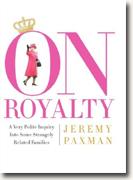On Royalty
Jeremy Paxman
book reviews:
· general fiction
· chick lit/romance
· sci-fi/fantasy
· graphic novels
· nonfiction
· audio books
· author interviews
· children's books @
curledupkids.com
· DVD reviews @
curledupdvd.com
newsletter
win books
buy online
links
home
for authors
& publishers
for reviewers

 |
On Royalty: A Very Polite Inquiry Into Some Strangely Related Families Jeremy Paxman PublicAffairs Hardcover 370 pages May 2007 |
|
To paraphrase Kermit the Frog, "It's not easy being queen..." or king either, to judge by BBC presenter Jeremy Paxman's wryly humorous but often equally depressing tales of royal joys and woe.
Prince Charles had a famously dreadful adolescence, being shamefully hazed and indeed tortured by schoolmates who thought it funny to drub the man who would be king while they had their chance. Almost no one bothered to be kind to him at the old-world boarding school where Prince Philip, his phlegmatic brooding dad, had survived in his day. That Charles's sons have suffered less at far more elite establishments speaks to the boys' outgoing, sports-loving natures, more modern, flexible and capable of surviving teasing and torments than their introverted father. Elizabeth and her sister, Margaret, were not educated at all except by a tutor; being girls, it wasn't thought necessary that they should learn anything, and even now the Queen's intellectual prowess is considered spotty. What she is best at is being a monarch, and that is by an overwhelming majority, what her subjects want her to be. She can keep a smile fixed on her face for hours at a time and ask apparently genuinely curious questions of teenagers in a technical college and little schoolchildren who have carefully memorized the set answers, thereby playing the game with the world's most famous granny. One such visit among the commoners prompted one of the Queen's subjects to declare, "We must not be so bad if she came to see us." It is such respect that keeps the monarchy intact despite its many obvious warts. The book concentrates more on the English royal family because these days, there's not much monarchy elsewhere left to joke about. Denmark has a remarkably intelligent queen, and Spain retains a titular monarch for reasons of its own. Of the remnants that are peppered through Europe, most are at least distantly related, a chummy club that has stood proudly if a bit unsteadily against the backdrop of the modern world, gradually losing power but not prestige for the past 50 years. Sometimes kings or queens have lost their heads, and sometimes they worry that they might. Queen Elizabeth told Paxman that some people who meet her are suddenly stricken with verbal diarrhea and begin spouting nonsense, so overwhelmed are they by being in her royal presence. She confesses that she often feigns a sneeze to keep from giggling. Royal succession is a major focus of being a king or queen. Kings thought to be thoroughly retarded and physically handicapped have produced viable heirs, while queens in the bloom of youth have failed to bring a baby to term. A future king such as Prince Charles must marry a virgin, and she must bear him sons; at least that's the fairy tale version. Diana was the victim of this stringent requirement, though Paxman is sure that she wanted to be a royal, wanted it enough to willingly sacrifice her freedoms. She entered into the alliance with her eyes wide open and ambition to the fore. The posthumous adoration of Diana is actually pretty standard stuff; Paxman recounts that "in 1861 Queen Victoria paid a visit to a military hospital" where a soldier at the point of death whispered, "Thank God that He has allowed me to live long enough to see your Majesty." Kings and queens are supposed to be the next thing to gods and goddesses, so it was no great surprise that Diana rose to angelic status after her death, despite her immoral meanderings. Paxman must have had fun putting this richly informing book together, as he has fun at the expense of royalty - but, hey, they can certainly afford it. Originally published on Curled Up With A Good Book at www.curledup.com. © Barbara Bamberger Scott, 2007 |
|
|
|
 Click here to learn more about this month's sponsor! |
|
| fiction · sf/f · comic books · nonfiction · audio newsletter · free book contest · buy books online review index · links · · authors & publishers reviewers |
|
| site by ELBO Computing Resources, Inc. | |
 Not that being royal doesn't have its perks, mind you. No one keeps track of the jewels and other sumptuous gifts given by royals to royals (three swords in gold and diamond-encrusted scabbards, for one small example). Such throne booty often disappears somewhere behind the regal curtain, possibly being considered as personal gifts. Not that you'd necessarily want to keep all the gifts you get as a member of the royal classes; Queen Elizabeth II has been the recipient of everything from a baby elephant, a bale of cotton and 100 hotdogs to a nylon bikini and a biscuit tin.
Not that being royal doesn't have its perks, mind you. No one keeps track of the jewels and other sumptuous gifts given by royals to royals (three swords in gold and diamond-encrusted scabbards, for one small example). Such throne booty often disappears somewhere behind the regal curtain, possibly being considered as personal gifts. Not that you'd necessarily want to keep all the gifts you get as a member of the royal classes; Queen Elizabeth II has been the recipient of everything from a baby elephant, a bale of cotton and 100 hotdogs to a nylon bikini and a biscuit tin.